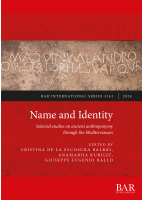Description
This volume analyses the importance of onomastics and its impact on the ancient world (i. e. Greek, Roman, Graeco-Roman, and various indigenous onomastic systems) for the construction of identities, societies, and ways of thinking. It does so from an interdisciplinary perspective, including elements of linguistics, epigraphy, history, Roman law, theatre, anthropology, and archaeology. The volume explores the presence of linguistic calques and semantic transfers in ancient anthroponymy, the use of "speaking" names, the avoidance or circumventing based on the genre, the legal aspects of onomastics structures, and the acculturation processes that defined individual or collective identities through onomastics and naming. "Name and Identity" delves into cases from the Greek Aegean, Pre-Roman and Roman Italy, the wider Roman world, the Iberian Peninsula, and South-Eastern Europe.
AUTHOR
Cristina de la Escosura Balbás, postdoctoral researcher at the Complutense University of Madrid, focuses on colonization through the Mediterranean during the Republic: hibridation, epigraphy, gender and postcolonial studies, Roman law.
Anamarija Kurilić, full Professor of Ancient History at the University of Zadar, focuses on Latin epigraphy, anthroponymy, demographic changes, and social, economic and military history.
Giuseppe Eugenio Rallo, PhD in Classics from the University of St. Andrews, studies identity, gender, theatre, and Latin literature history, with emphasis on the mid-Republican era.
Contributors: Juan Manuel Abascal Palazón, Anthony Álvarez Melero, Alberto Barrón Ruiz de la Cuesta, Anna Chiara Bassan, Claudia Ciancaglini, Dan Dana, Cristina de la Escosura Balbás, Elena Duce Pastor, Alexander Falileyev, Estela García Fernández, Gian Luca Gregori, Javier Herrera Rando, Dragana Nikolić, Tuomo Nuorluoto, Ivan Radman Livaja, Giuseppe Eugenio Rallo, Florian Réveilhac, Rada Varga, Julijana Visočnik
REVIEW
‘The regional case studies really help to open up these local onomastic sub-fields to those not specialists in those areas.’ Dr Benet Salway, University College London
‘This book provides fresh air on the onomastics studies which usually are too specialised, too focused on a (too) limited scope.’ Professor Araceli Striano Corrochano, Universidad Autónoma de Madrid











